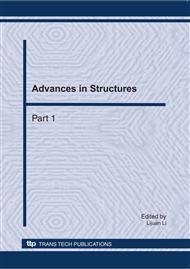p.2625
p.2632
p.2637
p.2641
p.2647
p.2653
p.2657
p.2666
p.2670
Experimental Research on Influence of Temperature on PZT-Based Health Monitoring for Smart Aggregates
Abstract:
Since piezoelectric materials exhibit strong temperature dependency. The change of temperature results in marked variation of the PZT transducer’s electric impedance signals, which may lead to misjudgment of the structural health condition. A experiment was implemented on smart aggregates with embedded PZT transducers under 35°C, 45°C and 55°C three working conditions, and found that the temperature had significant influence on the electric admittance signals of embedded PZT transducers. The peak magnitudes of the admittance curves changed and the curves shifted leftward. Then a temperature compensation technique was used to minimize the temperature effects.
Info:
Periodical:
Pages:
2647-2652
Citation:
Online since:
December 2010
Authors:
Price:
Сopyright:
© 2011 Trans Tech Publications Ltd. All Rights Reserved
Share:
Citation:


